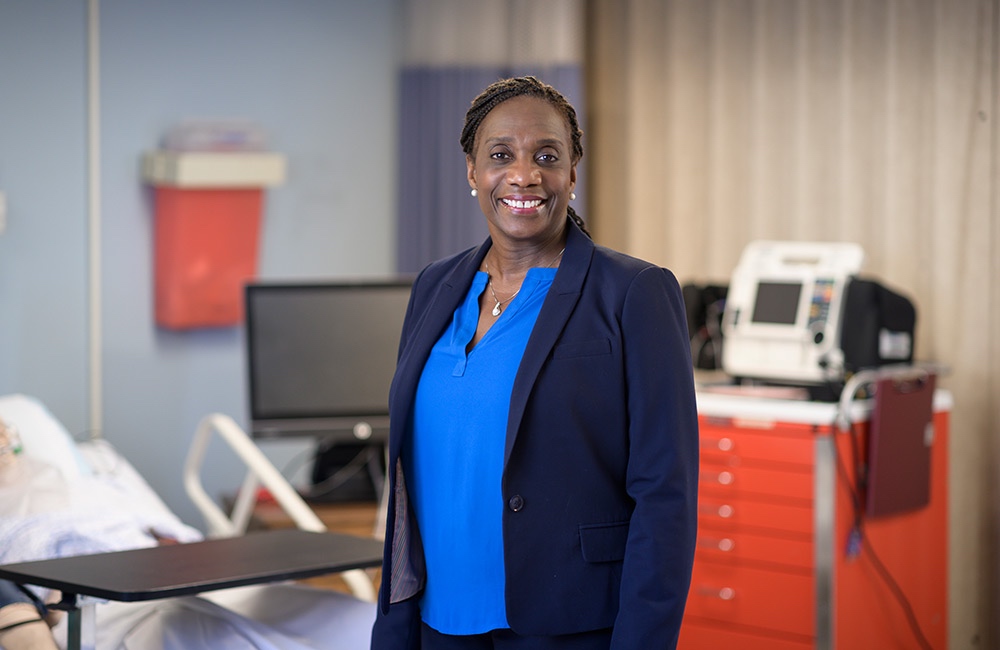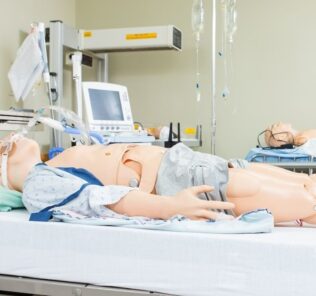Drexel University College of Nursing Faculty Develop Virtual Simulation Practicum Amid COVID-19
Healthcare simulation educators within higher education know a thing or two about flexibility. As the COVID-19 pandemic began vastly impacting the world, colleges and universities were forced to find a way to rapidly transition from an on-campus to an online learning model. During this time, Drexel University’s College of Nursing and Health Professions had a unique advantage. With over 40 online programs in nursing and healthcare, the college had the infrastructure and experience needed to shift courses online.
Yet, even in terms of programs designed to be completed virtually, some had in-person components that needed to be reimagined. For example, the online MSN in Nursing Education culminated in a three-day, on-campus practicum that allowed learners to engage in clinical simulation-based education. How, then, were educators supposed to bring these healthcare simulations online and ensure learners still receive the full experience of the practicum?
At Drexel University’s College of Nursing, that job fell to Kate J. Morse, Ph.D., the assistant dean for experiential learning and innovation and an associate clinical professor. Upon the onset of the coronavirus pandemic, she and her team worked to transition the practicum to an online environment, collaborating with representatives from Zoom to make sure they were using the online conferencing platform in the most engaging way possible. Most importantly, a simulation experience where learners work with a standardized patient, a centerpiece of the practicum, was able to move seamlessly into the virtual space.
Sponsored Content:
Jennifer Myers, MSN, an assistant clinical professor at the university, explained how the virtual simulation works. Before the healthcare simulation portion of the practicum, learners are given a brief description of what to expect during their clinical simulation, along with a link to the Zoom room. Learners meet with a standardized actor playing the role of a nursing learner and then receive feedback from that actor based on their performance. They also receive a debriefing from a faculty member.
Currently, each practicum includes one healthcare simulation experience with a standardized actor, though Myers says that an additional experience is expected to be added beginning in 2022. The immersive simulation is integrated into other active learning strategies online. Together, these activities, she explained, are essential for preparing learners for life outside the classroom.
“The whole point of simulation is giving the students the opportunity to practice their communication skills, their team approach, their critical thinking. This gives them the opportunity to practice that in a safe environment. It’s taking out the risk of hurting a patient, or saying the wrong thing to a student,” Myers said. “It really gives them the opportunity to apply their skills.”
Myers speculated that the addition of technical elements to the healthcare simulation may have been a little nerve-wracking for some learners in the beginning.
Sponsored Content:
“You’re adding in that online piece, that technology piece. What happens if I get in the room and I don’t see somebody, or what happens if my WiFi goes out?” she asked.
Healthcare Simulation Degree Programs: Comprehensive List
Yet learners are given an orientation before their experience where they are fully briefed on what to expect. This, Myers explained, was almost identical to what learners encountered in the face-to-face environment.
“We meet with them, explain the situation, explain what they’re walking into, and then they knock on the door and walk into the room. It was the same concept,” Myers said.
The online practicum has been so successful that Drexel is even considering keeping this program fully virtual in the future.
“We get a lot of great, positive feedback from the students,” Myers said. “It gives them an innovative approach. They have more exposure to these virtual teachings, so the hope is that they go out and become agents for changing themselves with this type of teaching technology.”
More About Drexel University
Located in Philadelphia, Pennsylvania, Drexel University Online offers quality internet-based higher education, including 140+ fully-accredited master’s degrees, bachelor’s degrees, and certificate programs. Since 1891, the university has built a reputation for educating some of the most innovative and forward-thinking students in the country and around the world.
At Drexel, the faculty is a mix of full-time professors and current industry leaders, all with years of experience in their fields. Members of Drexel’s faculty have started biotech companies, conducted research on the neuroscience of learning, served in the military, and even worked on Supreme Court cases. They bring this diverse and far-reaching experience to the classroom, infusing their courses with real-world experience to ensure students are learning what really matters in their careers.
Online students learn from the same faculty as their peers on campus, meaning they have access to some of the brightest minds in the country, no matter where they are located. Each program is designed for professionals who want to complete their education without compromising quality for convenience. Ranked by U.S. News & World Report among the “Best Online Graduate Programs” in the fields of business administration, engineering, nursing, and library science, Drexel’s online programs are among the elite in the nation.
Learn More About Drexel University’s Virtual Simulation Practicum
Lance Baily, BA, EMT-B, is the Founder / CEO of HealthySimulation.com, which he started in 2010 while serving as the Director of the Nevada System of Higher Education’s Clinical Simulation Center of Las Vegas. Lance also founded SimGHOSTS.org, the world’s only non-profit organization dedicated to supporting professionals operating healthcare simulation technologies. His co-edited Book: “Comprehensive Healthcare Simulation: Operations, Technology, and Innovative Practice” is cited as a key source for professional certification in the industry. Lance’s background also includes serving as a Simulation Technology Specialist for the LA Community College District, EMS fire fighting, Hollywood movie production, rescue diving, and global travel. He and his wife live with their two brilliant daughters and one crazy dachshund in Las Vegas, Nevada.
Sponsored Content:






















